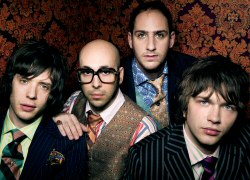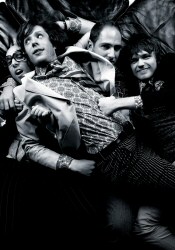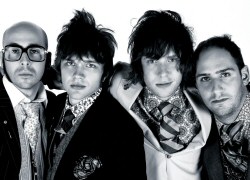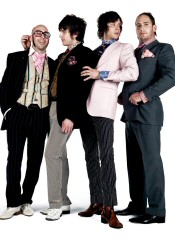 Interview with Damian Kulash Interview with Damian Kulash
by: Will Harris
08/25/05
With instantly catchy songs like ďGet Over It,Ē
ďYouíre So Damned Hot,Ē ďC-C-C-Cinnamon Lips,Ē and ďBye Bye Baby,Ē Chicago
popsters OK Go took the alt-rock world by storm with their self-titled debut of
2002. While in the midst of US tour with labelmates the Redwalls and preparing
for the release of their sophomore effort, Oh No, OK Goís lead singer, Damian
Kulash, took some time out to chat with Bullz-Eye about the transition from
first to second album, the bandís diehard fans, and what Ric Ocasek has in
common with a strip club in Providence, Rhode Island.
|
Damian Kulash: Hi, Will.
Bullz-Eye: Hello, how are you?
DK: Great, and yourself?
BE: Not bad at all. So how much press have you been doing today?
DK: Uhhhhh...this is the...fifth or sixth one, I think? But Iím doing
them in the comfort of a nice hotel room, so Iím fine.
BE: Whew! Now, I donít actually have a hard copy of your CD yet; when is
it due for release?
DK: Itís due for release on Tuesday. A week from two days ago.
BE: And are you excited to have it in stores?
DK: Very! Itís a helluva sort of rollercoaster, the last couple of weeks
before your record gets released, because itís, like, you spent...I donít know
if everybody is as sort of obsessive and manic as we are, but weíve been working
on this thing for months Ė in fact, probably years...or a year...at this point Ė
and itís sort of like our whole lives have been compressed down into this tiny
little shiny disc. Itís, like, everything is...itís all been crammed in there,
and now itís just sitting there, waiting in some boxes to be shipped out to
stores, to see what people think of it.
BE: Iím sure your fans are absolutely ecstatic. I know you have a pretty
diehard fan base.
DK: We do have some pretty insane fans.
BE: The Jugglers, as it were. (NOTE: The Official OK Go Fan Community
is known as The OK Go Juggling Club.)
DK: (Laughs) Yeah, the Juggling Club! I wonder...you know, our
street team Ė itís basically a street team, the Juggling Club Ė it was named by
Jorge, my best friend and who runs our website, and Iíve never talked to him
about what the reference is. Because it seems like...and no offense to the
jugglers of the world...but the juggling club, isnít that the domain of the uber-nerds
in high school? Isnít that the thing that people are a little scared of? Like,
ďOmigod, those dudes are from the Juggling Club....!Ē
BE: Yeah, that and hackey sack, I think.
DK: Right! I suppose heís just appealing directly to the sensibilities of
those who are already extremely nerdy. Or maybe heís making fun of the same
people who are in it...? But theyíre great, those Juggling Club people, I love
them! ĎCause they troll around the internet and do all this great stuff, they
vote for us on things, they come to our shows and take pictures of us...I love
those Juggling Club people!
BE: You know, the first time I ever heard you guys was when you opened
for They Might Be Giants.
DK: Oh, wow!
BE: You played the now-defunct Boathouse, in Norfolk, Virginia.
DK: That place is gone, huh?
BE: Well, technically, itís still there, but it got really ravaged by a
hurricane a few years ago, to the point where it was literally going to cost a
million bucks to repair it.
DK: Wow. I was surprised that place was set up like...it seemed like one
of the strangest designed venues I had ever played in. It was like the stage
seemed to be facing the wrong way. It was a weird place.
BE: But it had some significant history.
DK: Yeah, I know a lotís happened there.
BE: Actually, the Violent Femmes just released a DVD of a show they did
there back in 1991!
DK: Really? We got to play with the Violent Femmes once.
BE: Where was that?
DK: Madison, Wisconsin was the wonderful place where we played with them.
BE: Was it just a one-off thing?
DK: Yeah. For a short time, we were managed by the same people. And, now,
weíre actually pretty regularly playing a Violent Femmes cover in our live set,
because Iím a big fan.
BE: Which song?
DK: ďProve My LoveĒ (from the bandís 1983 self-titled debut).

BE: Very cool. Now, when you were opening for They Might Be Giants, was
that your first full-on national tour? Because I know it was still pre-Capitol,
or at least, it was before the album was released, anyway.
DK: Yes. We did some regional, Midwestern touring by ourselves, and we
did one East Coast run with an indie rock band that we were friends with years
ago, but I think the first sort of national touring was, yes, with They Might Be
Giants. Around the same time, we did a series of shows with This American Life,
the radio program on PRI (Public Radio International)...but that wasnít
really a tour. Weíd play shows by ourselves in the middle of the week, and,
then, on the weekends, weíd do these big shows with them. So itís kind of hard
to call that a national tour. But, yeah, around the same time, we started doing
big tours with They Might Be Giants. And we toured with them a lot. We
actually probably did two full circles of the country with They Might Be Giants.
BE: Now, whatís the Ira Glass connection with yaíll?
DK: Well, I used to work at public radio in Chicago, so heís just a
friend through work, basically. But to be a little more honest, we worked in
different offices of public radio, so I never saw him or anything, and he just
came out to see our band play once because he had heard good things about it Ė
completely unconnected to any public radio thing Ėand he became a fan of the
band. And when he realized that I also worked in the organization somewhere, we
started hanging out.
BE: I know that, in the never-fallible All Music Guide, they refer to you
as being less pretentious than some of your Chicago peers.
DK: (laughs) You know, itís hard to say what the Chicago scene is
now Ė and frankly, I donít spend enough time there to really know Ė but
certainly, in í99, when we were playing our first shows, pretty much everything
that people were paying attention to in Chicago Ė and Iím sure there was other
stuff going on Ė but the stuff that was getting national attention was
extremely, extremely heady instrumental music. And some of it was incredible!
But it was that sort of noodly, avant post-rock had a stranglehold on Chicago at
the time, so I think we seemed, by comparison, very, very different.
BE: You guys are definitely masters of harmonies.
DK: Thank you. Thatís very kind of you to say.
BE: Do you consider it a curse that some people think of you as power
pop?
DK: (hesitates) I have to say, itís true, weíre power pop. I sort
of resisted because, when I was growing up and in high school in the Ď90s, the
term power pop by then seemed to connote something along the lines of southern
California pop-punk. To my mind, power pop and pop-punk were the same thing 10
years ago. Iíve since realized, as Iíve learned more about music, that...well,
the phrase ďpower popĒ was coined by the Who to describe their own music. And I
know that Cheap Trick, who are all-time idols of mine, are sort of seen as a
seminal power pop band. So Iíve realized that power pop is not a bad thing to be
called, and it is, I suppose, a pretty accurate description of what we do. We
do, yíknow, loud but singable music. So, sure, I guess weíre power pop. But I
sort of wish there was a term that would differentiate it somehow from pop-punk.
Thereís just something wrong about that.
BE: Okay, I gotta jump back to the All Music Guide just one more time,
because thereís a line in their review of your debut album that I just find to
be generally hysterical. It describes yaíll as ďhaving the raw sex appeal of the
Backstreet Boys, the ebullient energy of Hanson, and the wacky alternative rock
vibe of Weezer.Ē
DK: Wow!
BE: Please discuss. Have they gone wrong or not?
DK: Well, uh, I...Iím sure those are meant to be compliments. I think of
us as being ebulliently energetic, and I think of us as being relatively
attractive, and I think of us as being sort of...indie rock-ish. Iím not sure
that I would call us wacky...although we do do choreographed dancing on stage
sometime. The references all seem a little bit saccharine...but, then again, I
guess our first record was comparatively saccharine. It was a pretty sugary
record at times. Itís hard for me to comment on what people write about us or
what people think about us, because I think my own impression of us is so
totally distorted, because itís our band.
BE: Well, youíre a little close to the topic.
DK: If thatís what they think, I guess thatís what we are. Our first
record got a lot of Weezer comparisons, I think, because it was loud and had a
lot of sort of Cars-styled keyboards, and Weezer was the only contemporary
reference for that, without citing the Cars directly, yíknow. And the fact that
both Rivers Cuomo and I went to Ivy League schools, so weíre seen as the sort of
smarty-pants rockers or whatever. And I like Weezer. Weezerís great. I think
weíre in a slightly different direction than they are right now. I think our new
record is more organic and sort of loose at the seams. Itís a little more rock
and a little less power-pop. Less gleamy and a little bit more...churning. I
think itís groovier and less saccharine.
BE: Is that a rebellion against perceptions, or just a natural evolution
of the band?
DK: Um...itís a pendulum swing, I think. Iím not sure if I could honestly
say if it had more to do with peopleís perceptions or our own gut instincts. Our
first record was a very intentionally overproduced studio project. At the time,
the world seemed to have two modes, as far as we could tell: the indie mode,
which was remarkably obtuse and hard to access with your heart as much as your
brain, and the commercial rock world, which seemed to be either the droning,
moaning diary music Ė the Creed and Nickelback thing Ė or Nu Metal. So we were,
like, whereís the happy music? Where are the David Bowies, the Beatles, and the
Princes of the world, that make you actually want to be happy when you listen to
their music? So we decided to make as much of an in-your-face, aggressively
catchy pop record. And, so, we were really... (pauses) I canít believe
Iím spending this much time discussing our first record when Iím supposed to be
talking about our new album! But, anyway, that record was basically a studio
project. We really just indulged ourselves with everything we could do in the
studio, and itís all bells and whistles and stacking up guitars and harmony
after harmony after harmony. The new record, we really wanted to focus more on
the groove of it, and what our band really sounds like. The first record,
looking back on it, it sometimes feel a little...suffocated. Like, the whole
thing is just so crammed full of bells and whistles that there isnít a
lot of groove left. So this record, I think itís a lot more heartfelt. Itís more
rockiní! More propulsive, more energetic. We left a lot more space. We pared it
down to the elements that were necessary to get the songs across instead of
cramming it full of stuff. I think itís still as melodic and catchy, but itís
much more earthy and loose at the seams.
BE: Did you road-test a lot of the songs on the album?
DK: Not too many. A couple. There were two of them, I think that we did
on the road a bunch when we were touring for the last record. And then a few of
them...another half of the record, Iíd say...we did a short tour in February of
last year where we played them to see how people reacted. But most of them were
just written in rehearsals together and playing in the studio.

BE: Howís the reception been so far?
DK: Oh, itís been fantastic. Itís been really great. I canít say weíve
had any negative responses, really. Itís been wonderful. I imagine that, when
the record gets out there, there will be some from those whoíre specifically a
fan of the overproduced quality of the last record. This oneís a lot rougher.
But, so far, people seem to love it.
BE: Well, if the hooks are still there, Iíd think you could still pretty
much pull people in who liked the last one.
DK: Yeah! We didnít really start writing a very different way. In terms
of the impulse behind the songs, theyíre still all very hooky and singable and
short, succinct pop songs. We havenít gotten into total self-indulgent 15-minute
groove songs.
BE: As far as your pop influences, some of them would seem obvious, but
Iíll ask you directly. The Beatles? Queen? The Cars...?
DK: Yeah, all those are right up there. Weíve been listening a lot to the
Buzzcocks recently...T. Rex, Bowie, the Stones, Sweet, Sparks. I really like
Sparks. And, of course, weíre huge fans of the Pixies, which I think comes out
much more on this album than it did on the last. Iím trying to think who else.
Prince? (pauses) I think thatís a pretty decent list.
BE: Based on that list, it sounds like the new album is crunchier than
the last.
DK: Yeah, a little bit. Itís weird. I think it sounds bigger because
thereís less in it, if you know what I mean. When we were making it, I
visualized it as follows. If all possible musical space were a sphere...if all
the sounds that you could put into a song were a sphere...our last record filled
up that sphere pretty much entirely. It wouldíve looked like a soccer ball from
the outside. Each individual element took up as much space as it could until you
had this tiled object. And our new record, I think we left a lot out. So you get
something more like a spiky porcupine ball in the middle of the sphere. And
while a lot less is actually going on Ė instead of fifteen guitars playing one
line, thereís only one guitar playing each line Ė it sounds a lot bigger,
because things stick out of it. There are jolting things, and thereís stuff that
sticks up in your face. You donít have to fight the overall fullness of it.
BE: You know, you mentioned T. Rex a minute ago; have you had a chance to
see the live T. Rex DVD that just came out, ďBorn To BoogieĒ?
DK: No, I havenít. You know, I donít think Iíve ever seen any live
performance by them.
BE: Itís from the Ď70s, but it was directed by Ringo Starr.
DK: (hearing incorrectly) By Ric Ocasek...?!?
BE: No, no, Ringo Starr. Although Ric Ocasek has a new album out, too.
DK: Oh, yeah? How is it? Have you heard it?
BE: Yeah, itís really good. I guess youíd call it glorified demos, but
thatís what he was going for. Just him in the studio.
DK: Thatís cool. You know, the night after Tim (Nordwind, OK Goís
bassist) and I wrote our first song together, in college Ė we had been
friends for years and years before that, but, for some reason, it never crossed
our minds to write songs together Ė and he came to visit me, and we wrote this
song. We stayed up all night recording it. And, at 7 in the morning, we went
back to my apartment, and my girlfriend was sleeping, and she woke up. It was a
Friday morning in Providence, Rhode Island. And on Friday mornings in
Providence, Rhode Island, you can go to this strip club called The Foxy Lady and
have what they call the businessmanís lunch...the official name of which is Legs
and Eggs. So we went to have Legs and Eggs after we had written that first song
Ė with my girlfriend, who I think was more amused by the whole affair than we
were Ė and, at Legs and Eggs, there was a drawing when you came in, and she won
the drawing....and what she got was a Ric Ocasek album. (pauses) And I
have to say, it was not his finest work.
BE: (laughs) You donít remember which one it was, do you?
DK: I do not. But it did not have the inspiration that he has had at
other times in his career, letís just put it that way.
BE: Well, the true proof of that is that it was given away during Legs
and Eggs.
DK: Yeah, I think when your albumís being given away at a strip club,
itís probably not doing very well.
BE: Have you bought any new CDs lately?
DK: Yep. I bought the new Spoon album, which Iím very pleased with. I
think itís a great record. I bought the Arcade Fire record, which I like. What
else? Do you know Sam Phillips? Not the Elvis producer, but...
BE: Right, T-Bone Burnettís wife. Iíve got a couple of her CDs.
DK: I just got...whatís it called?...A Boot And A Shoe. I think
thatís a beautiful record.
BE: Sheís got an album called The Indescribable Wow thatís really good.
DK: Iíll have to check it out. Oh, hereís a new one that I got, but I
donít know new the record is. I think itís her most recent one. But sheís a
songwriter named Mirah. I think sheís from the Northwest. Olympia? The record I
got is called Advisory Committee, and itís just fantastic, a really, really
great record. From what I understand, all of the backing tracks on it were done
by the guy who is also in the band the Microphones (Phil Elvrum), but her
songwriting has a very beautiful, folky thing. Itís like if Elliot Smith werenít
quite so depressed. And was a girl. And then itís set to slightly experimental
backing tracks. Itís really, really nice.
BE: So when do you guys hit the road to support the new album?
DK: Weíre on the road right now. I speak to you from Dallas, Texas.

BE: Headlining?
DK: Yeah, right now, weíre headlining. Weíre gonna go over to England to
be openers for Brendan Benson for awhile, then we come back here and do some
dates with Rufus Wainwright, and then back to England for some Kaiser Chiefs
dates. Weíll be out all year if we can.
BE: Now, see, of that bunch, the one that seems the most like it wouldnít
belong would be you and Rufus Wainwright.
DK: Well, Iím friends with Rufus, and I think that has something to do
with it. He was very smitten with our choreographed dancing on our last tour, so
I think he just wanted us to come do it before he played. (laughs) Weíre
certainly louder and more rock Ďní roll than he, but, songwriting-wise, I think
thereís actually a similar indulgent melody thing. Weíre not a shouty, droney
rock band. Weíre melodic. All of our songs are based around melody. And heís an
incredible, incredible songwriter. I think weíll fit just fine.
BE: Well, since my editorís a big Rufus Wainwright fan, that would seem
the perfect place to end our conversation, but I do want to ask one last
question: on the new album, do you have any personal favorite songs that might
not necessarily be chosen as singles but that youíre particularly fond of?
DK: The song that I hope gets picked as a third single is called ďOh
Lately Itís So Quiet.Ē Itís a quiet little falsetto soul song, so it doesnít fit
peopleís expectations of us, I guess...but Iím really, really happy with it.
BE: Excellent! Well, itís been a pleasure talking with you.
DK: Nice talking with you, too. Thanks for your time!
Send any questions or comments to wharris@bullz-eye.com.
|
 |
|